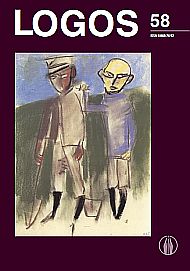Motiejaus Gustaičio Kûrybinis Palikimas
Creative Heritage of Motiejus Gustaitis
Author(s): Algimantas LiekisSubject(s): Poetry, Political Philosophy, Social Philosophy, Hermeneutics
Published by: Visuomeninė organizacija »LOGOS«
Keywords: Motiejus Gustaitis; creative heritage; culture; nation; deportation; Independent Lithuania;
Summary/Abstract: Priest, poet and pedagogue Motiejus Gustaitis (1870. 02. 27. - 1927. 12. 24.) is among most prominent persons who revived Lithuanian national self-consciousness at the beginning of the 20th century. He graduated from the gymnasium in Marijampolé and Seinai Priest Seminary. M. Gustaitis was one of the best educated priests and intellectuals in Lithuania. After graduating from the seminary, he studied literature and philosophy in Freeburg (Switzerland), music in Rogensburg, Canon Law in Jesuit St. Apolinar University in Rome. After returning to Freeburg in 1903, he defended his doctoral dissertation on the topic of A. Mickevièius’s (A. Mickiewicz) poetry. Having come back to Lithuania, he worked as a chaplain in Marijampolë, Seinai, and its Lazdijai gymnasia, as a teacher and director. During World War I, he was concerned with the teaching of children of Lithuanian deportees in Russia. Throughout this time, he also wrote copiously to reestablish independent Lithuania and published his poetry. The attempt to publish in 1940 a collection of his poetry was not successful. The Soviets broke into the Sakalas Printing House in Kaunas and burnt the collection of poems, which was almost ready for print. Only one or two copies were saved by a worker who passed the copies to M. Gustaitis’ grandson, Algirdas Gustaitis, who in turn rescued a copy during the years of deportation and gave it to the present author in Los Angeles, USA. The present author published that collection as a separate book “Motiejus Gustaitis - Priest, Poet, Teacher” (V. 2008. 406 p.), now available for the broad circle of readers. The article not only elucidates succinctly the history of that book, but also presents the life of M. Gustaitis and gives an evaluation of the importance of his creative heritage for the present-day life.
Journal: LOGOS - A Journal of Religion, Philosophy, Comparative Cultural Studies and Art
- Issue Year: 2009
- Issue No: 58
- Page Range: 113-121
- Page Count: 9
- Language: Lithuanian

